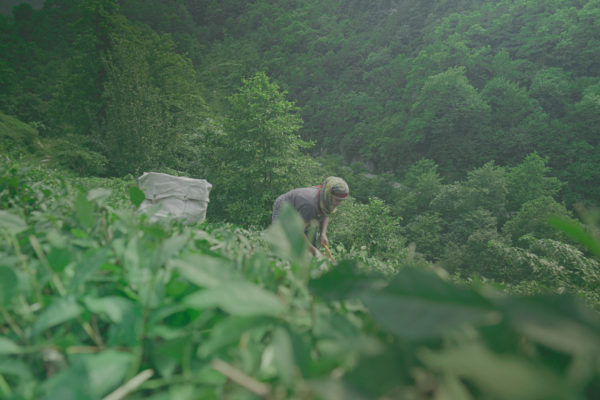Sheida Kiran: Global Short Docs Forum
In August 2021, Medical Aid Films Production Coordinator Sheida Kiran spent a month living with tea picking women on the Black Sea Coast in Turkey to film her master’s final project. Now she is embarking on intensive programme which will prepare her to pitch her film to a panel of Commissioning Editors, thanks to One World Media’s Global Short Docs Forum. Sheida tells us more about the film and what she’s looking forward to from the programme.
I visited the Black Sea Coast community of tea picking women a couple of years ago and I found the women I met to be incredibly strong and powerful yet exploited because of a lack of land ownership and traditional free labour practices.
For my master’s final project, ‘Harvesting Our Freedom’, I went to their community and spent a month with them. I lived with them, ate with them, slept in their homes, they drove me to places, I climbed tea mountains with them. I got very hot, and very wet, but it enjoyed it and more importantly I got to know these women and capture their stories.
My film follows three tea picking women of three different generations. They have different perspectives on what it means to be a part of this system: some women find it oppressive; some find it liberating, giving women agency within it. My documentary is a glimpse into their lives and attempts to untangles the stereotypes of Black Sea women: perceived as hardworking, powerful yet simultaneously oppressed.

I’m really pleased to have been accepted by One World Media into the 2021 Global Short Docs Forum with this film. One World Media supports new filmmakers and supports them to build a platform for their filmmaking and films, helping us to navigate the world of pitching and commissioning.
The programme is an intensive week-long event of learning how to present and pitch my documentary. At the end of it, I will have the opportunity to pitch it to a panel of commissioning editors from organisations such as BBC, Al-Jazeera, and The Guardian. It can be hard to know what to do with a film once it’s complete, and without the right approach it could stay on a hard drive, never to be seen by anyone.
Documentary filmmaking can be isolating, and I’m excited to get to know the other 11 filmmakers and to be in a hub of fascinating and talented new filmmakers from all different backgrounds and cultures.
Medical Aid Films has supported me during the past 2 years I’ve been involved, and the organisation has helped me develop my filmmaking. Being in the Global Short Docs Forum means that I can take everything I’ve learned from Medical Aid Films and my master’s degree and share the story of these women with people who can help spread it to the world. Medical Aid Films works to make content accessible and tell stories that might not otherwise be told; this is how I perceive my documentary filmmaking. I made a promise to these women that people would hear their story, and I want to do justice to them.